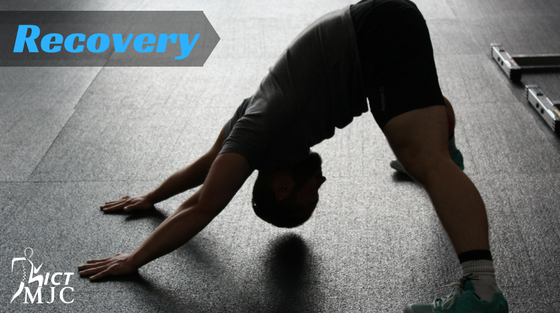Recovery
The old adage "no pain no gain" is a fool's philosophy. There are times in training you may feel fatigued, tired or outside of your comfort zone and this is fine. I am referring to the difference between "it hurts so good," and "it flat out hurts." If you are in the latter group, then you have missed out hugely on progress and performance.
Why Recovery is Important
Spending time on recovery helps to prevent "flat out hurt" by keeping the tissue within your body healthy and closer to 100% optimal quality. If your focus is on leaving the gym, court, field, etc., completely drained and weak, then your body has to spend time recovering. This will happen naturally, with or without your approval. Sometimes this can be felt over the next few days as DOMS – delayed onset muscle soreness. Also, some inpiduals can recover from this faster than others – simple fact of life.
If not enough time is spent in a state of recovery between training episodes, you increase the chance of developing overuse syndromes (i.e. IT Band Syndrome, strains/sprains, jumpers knee, rotator cuff tear). Think about your body as a car, you get oil changes and maintenance care on it to prevent it from falling apart faster. Without doing so, you would be buying a new car quite often. You only get one body, which makes taking care of it all that more important.
Pushing your body's limit and physical capabilities is important for a plethora of health conditions; it is beneficial to create adaptation and challenge the body physically. However, each person has a different limit to how much stress their body can withstand without having a negative impact upon it. This is why recovery is important. Recovery allows you to heal faster in order to train harder; this is training smarter. By incorporating recovery, you help to compliment and further progress the main focus of your goals – to continue training. Recovery creates a checks and balance system for your body, for continual growth while staying as optimally healthy as possible.
What Recovery Is and What It Is Not
Recovery is being pro-active and taking care of your body when you feel at the top of your game; it allows you to repeatedly do the things in life you love and enjoy. Recovery is not re-active care, or integrating various mobility drills and stretches when "flat out pain" is present. There are times in training and competing when you might have to participate hurt (depending on the severity), but attempting to eliminate pain through recovery alone will be an extremely long process, if beneficial at all. There is time for recovery and there is time to seek further, more-advanced care via: chiropractic, massage therapy, and physical therapy services.
The amount of time a person may spend on recovery is different from inpidual to inpidual. Someone who likes to lift weights for an hour a week may not need to spend any time in recovery, yet someone who spends 1-2 hours every day working out will need to spend time recovering. Below are two general rules to help you identify where you may be at on the spectrum.
2 General Rules to Follow with Recovery
- The older you are, the more time you should spend implementing recovery strategies.
- At some point in life, you need to face the music and understand you are not a young buck anymore. That does not mean training or working out has to suffer or be limited. It simply means, in order to keep your tissues healthy, you need to spend more time focused on activities or modalities that help you recover better and recover faster.
- The more you train, the more you need to spend time on recovery.
- I have talked with numerous high-level athletes and the ones who win understand concept #2; unfortunately, it is not often talked about. D1 and NFL football players may get treated multiple times in a single day, by a wide range of health professionals. Whether you are trying to get to this type of level (professional athlete), maximize your potential or prevent the loss of your current potential, then spending time in recovery is needed. You cannot outrun or outwork an overused muscle.
About the author
Dr. Keith Sparks is an award-winning chiropractor, functional medicine expert, and the co-founder of ICT Muscle & Joint Clinic. Dr. Sparks’ emphasis of care originated within the fields of rehabilitation, soft-tissue therapies, and chiropractic. To date, he has brought this unique combination of skills into union with functional medicine. The sole purpose of intertwining these distinct skills, knowledge, and services is to provide incomparable care to his local community. Dr. Keith Sparks is often seen in the Wichita, KS community speaking at business events and teaching health and performance classes.
